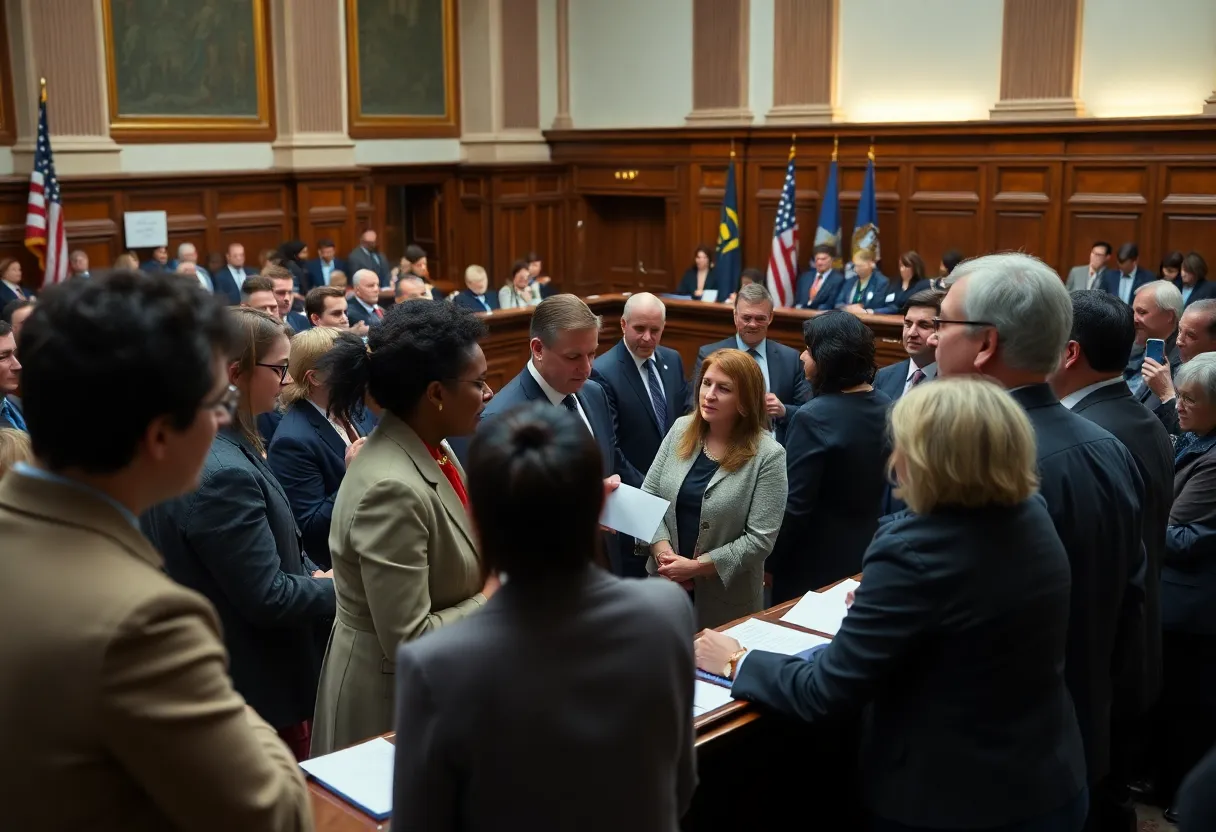News Summary
Pennsylvania lawmakers are moving forward with significant election reform through House Bill 771, which includes a voter ID requirement and changes to vote-by-mail laws. Following a bipartisan committee approval, some Democrats express support amid opposition within their party. Key components include improved procedures for mail-in ballots and measures for early voting. Despite financial concerns, public sentiment shows considerable backing for voter ID laws, while experts warn of potential complications for eligible voters. The legislative process will soon see these bills presented on the House floor.
Pennsylvania lawmakers are moving forward with a significant package of election reform measures that include the implementation of a voter ID requirement and modifications to current vote-by-mail laws. Following a closely contested vote, the House State Government Committee approved House Bill 771 with a bipartisan 14-12 decision.
This proposed legislation has been sponsored by Representative Thomas Mehaffie, a Republican from Dauphin County, and it has garnered the support of certain Democratic lawmakers. Reps. John Inglis and Nancy Guenst are among the Democrats backing the bill, although many within their party express opposition to strict voter ID requirements. Recent negotiations suggest that some Democrats may be open to compromise if their support for other reforms is assured.
The omnibus bill aims to address and clarify various provisions under the current vote-by-mail framework established by Act 77, which allowed voters to cast their ballots through mail without having to provide an excuse starting in 2020. This existing system has faced multiple legal challenges, prompting the proposed bill to enhance the notification process for voters whose mail-in ballots are rejected, particularly due to signature discrepancies.
Another key component of the proposed reforms includes House Bill 1396, which seeks to permit election workers to begin preparing mail-in ballots up to one week before Election Day. This measure aims to expedite the counting process and, consequently, the announcement of election results.
Concerns have been expressed regarding the financial implications of the proposed reforms. Representative Brad Roae from Crawford County pointed out the potential costs to local counties and questioned the speed at which the bill was introduced. However, the push for voter ID laws from Republican lawmakers is largely viewed as a reaction to long-standing, yet unfounded, allegations of voter fraud that have persisted over the past decade.
A previous voter ID requirement was deemed unconstitutional in 2014, leading to stalled efforts in advancing a new voter ID amendment after the Democratic Party regained control of the House in 2023. Despite historical contention, public sentiment appears to favor voter ID laws; a poll conducted by Franklin & Marshall College indicated that 73% of Pennsylvanians support such measures. The proposed legislation allows for various types of acceptable identification, including school and work IDs, as well as utility bills. Voters without proper ID can verify their identity through an affidavit that includes potential criminal penalties for false claims.
Opponents of the legislation, such as representatives from Common Cause PA, argue that voter ID laws complicate the voting process and may dissuade eligible voters from participating in elections. Research on the impacts of voter ID laws reveals mixed effects, with certain demographics more adversely affected by such regulations.
Representative Malcolm Kenyatta of Philadelphia highlights that fraudulent voting occurrences are exceedingly rare, amplifying concerns that the proposed reforms are unnecessary. Additionally, the Pennsylvania Department of State has begun implementing a $10.6 million initiative to modernize the state’s voter tracking and election systems to better manage the electoral process.
The omnibus bill also includes provisions for bond issues that will finance software and equipment upgrades across election administration. It mandates early voting, ensuring that polling places are accessible for a minimum of 11 days prior to Election Day for every 100,000 registered voters within each county. Furthermore, reforms call for an increase in pay for election workers to $175 in response to statewide worker shortages.
As the legislative process continues, the next steps will involve presenting the bills for consideration on the House floor, followed by potential movement to the Senate. The committee’s recent approval comes in the wake of prior commitments from Democratic leaders to engage in discussions regarding voter ID laws as part of broader election reforms. Despite longstanding disagreements surrounding voter ID measures, there appears to be a renewed willingness for compromise on the overall updates to Pennsylvania’s election laws. Election officials emphasize the critical need for legislative actions aimed at enhancing both the efficiency and security of the state’s electoral processes.
Deeper Dive: News & Info About This Topic
- Lancaster Online
- Wikipedia: Voter ID laws in the United States
- The Philadelphia Inquirer
- Google Search: pennsylvania election reform
- PennLive
- Google Scholar: Voter ID laws
- Citizens Voice
- Encyclopedia Britannica: Election

Author: STAFF HERE PHILADELPHIA WRITER
The PHILADELPHIA STAFF WRITER represents the experienced team at HEREPhiladelphia.com, your go-to source for actionable local news and information in Philadelphia, Philadelphia County, and beyond. Specializing in "news you can use," we cover essential topics like product reviews for personal and business needs, local business directories, politics, real estate trends, neighborhood insights, and state news affecting the area—with deep expertise drawn from years of dedicated reporting and strong community input, including local press releases and business updates. We deliver top reporting on high-value events such as Mummers Parade, Philadelphia Flower Show, and Thanksgiving Day Parade. Our coverage extends to key organizations like the Greater Philadelphia Chamber of Commerce and United Way of Greater Philadelphia, plus leading businesses in telecommunications, food services, and healthcare that power the local economy such as Comcast, Aramark, and Children's Hospital of Philadelphia. As part of the broader HERE network, we provide comprehensive, credible insights into Pennsylvania's dynamic landscape.





